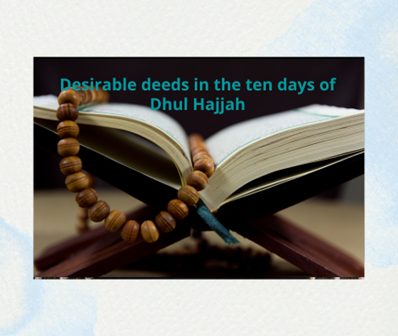The Virtues of Dhul Hijjah
Allah preferred times over others
Allah The Almighty said: “And your Lord creates what He wills and chooses; not for them was the choice. Exalted is Allah and high above what they associate with Him” (Al-Qasas: 68). Allah preferred times over others, so He chose times for which He singled out virtues and rewards. So that it is a reason to renew one’s resolve, and compete in good deeds. Among these virtuous times are the ten days of Dhul-Hijjah, which are characterized by several virtues and characteristics.
Allah has sworn by it in His Book to mention her honor and greatness of her stature, so the Almighty said: {By the dawn, and the ten nights, and the even and the odd} (Al-Fajr: 1-3), many scholars said: It is the ten days of Dhul-Hijjah.
And the Prophet(PBUH) testified that they are the greatest days of the world and that righteous deeds in them are better than in others, as in the hadith of Ibn Abbas, may Allah be pleased with them, where he(PBUH), said: They said: O Messenger of Allah, not jihad for the sake of Allah? He said: Nor jihad in the cause of Allah, except for a man who went out with himself and his money and did not return with anything from that) Narrated by al-Tirmidhi, its origin is in al-Bukhari, and in the hadith of Ibn Umar: (There are no days greater with Allah do not love him more than working in them than these ten days, so increase them in tahlil, takbeer, and praise) Narrated by Ahmad.
And on it is the Day of Arafat, on which he said (PBUH) – as in the hadith of Aisha, may Allah be pleased with her: “‘Aishah (May Allah be pleased with her) reported:
The Messenger of Allah (PBUH) said, “There is no day on which Allah sets free more slaves from Hell than He does on the Day of ‘Arafah”.
Fasting on the Day of ‘Arafah, expiates the sins of the year before and the year after. [Muslim]
And there is also the Day of Sacrifice, which is the greatest of days with Allah.
The Prophet (PBUH) said: “The greatest day in Allah’s sight is the day of sacrifice and next to the day of resting which Isa said on the authority of Thawr is the second day”. (Sahih)
The scholars have spoken about the comparison between them and the last ten days of Ramadan, and one of the best things that has been said about this is what have said that the days of the ten days of Dhul-Hijjah are better than the days of the last ten days of Ramadan, and the nights of the ten days of Ramadan are better than the nights of the ten days of Dhu al-Hijjah, combining the indicative texts On the merit of each of them, because the ten nights of Ramadan were preferred in consideration of Laylat al-Qadr, which is one of the nights, and the ten days of Dhul-Hijjah were preferred in consideration of the days.
There are good deeds that Muslims should do:
Sincere repentance and return to Allah, adherence to His obedience, and keeping away from everything that contradicts His command and prohibition, with the conditions of repentance known to the people of knowledge. Allah said,” And turn to Allah in repentance, all of you, O believers, that you might succeed”. (Surah An-Nur:31)
Among the deeds of the ten days of Dhul-Hijjah is the Islamic pilgrimage(Hajj) to the Sacred House of Allah, and Hajj is one of the greatest acts of righteousness, as the Prophet(PBUH)said: “ He said that Allah’s messenger was asked what action was most excellent and replied that it was faith in Allah and His messenger. He was asked what came next and replied that it was jihad in Allah’s path. He was asked what came next and replied that it was a pilgrimage which was accepted. (Bukhari and Muslim)
One of the greatest ways to draw near to Allah during these ten days is to preserve the duties and perform them in the manner required by law(Shariah), by doing them well, perfecting them and completing them, and observing their Sunnah and etiquette, and it is the first thing that a person engages in, before a lot of supererogatory and sunnah prayers.
Abu Hurairah (May Allah be pleased with him) reported:
Messenger of Allah (PBUH) said, “Allah, the Exalted, has said: ‘I will declare war against him who treats with hostility a pious worshipper of Mine. And the most beloved thing with which My slave comes nearer to Me, is what I have enjoined upon him; and My slave keeps on coming closer to Me through performing Nawafil (voluntary prayers or doing extra deeds besides what is obligatory) until I love him, (so much so that) I become his hearing with which he hears, and his sight with which he sees, and his hand with which he strikes, and his leg with which he walks; and if he asks Me something, I will surely give him, and if he seeks My Protection (refuge), I will surely protect him”. [Al-Bukhari]
After mastering the obligatory deeds, the servant should increase his supererogatory and recommended actions, increase what he used to do in other than ten days, do what was not possible for him to do in others, and strive to build his time with obedience to Allah Almighty, such as prayer, recitation of the Qur’an, and supplication Charity, kindness to parents, ties of kinship, enjoining good and forbidding evil, and other ways of goodness that are not limited.





